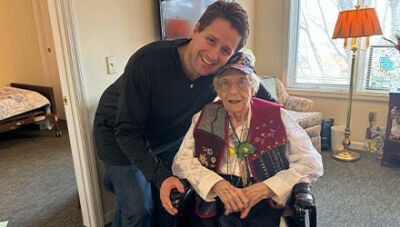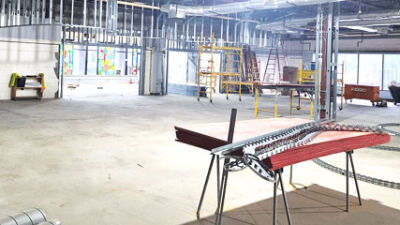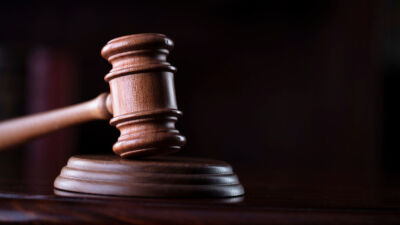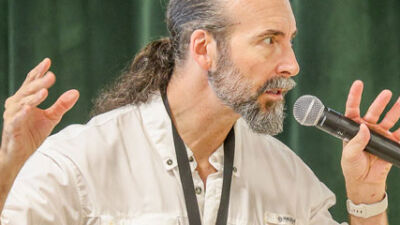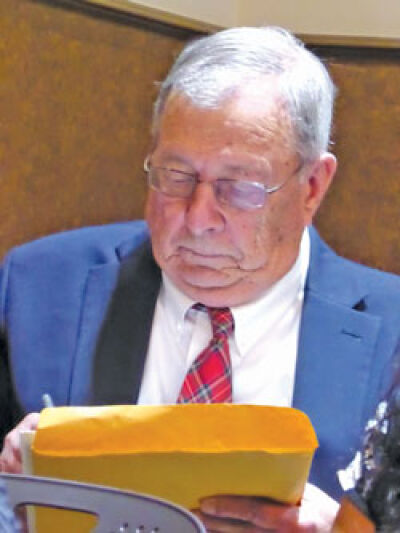
David Deacon became a citizen of the United States in 2019. He said he came to the U.S. in 1970.
Photo provided by David Deacon
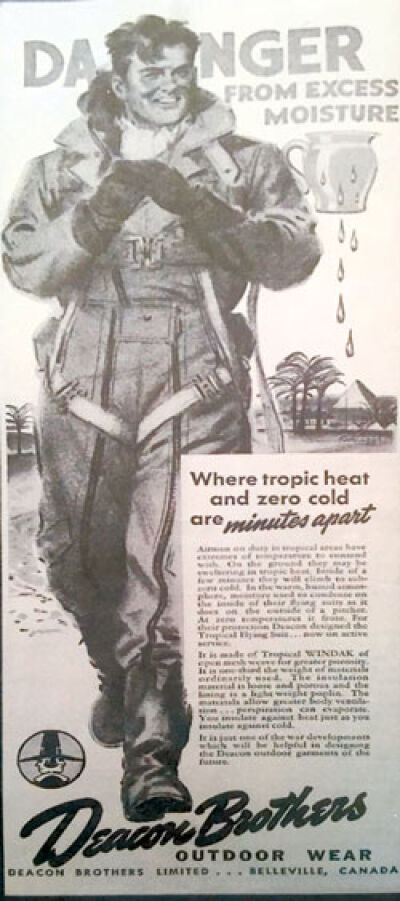
An advertisement shows the heated flight suits for Allied aircrews during World War II that Deacon said were invented and manufactured by the Deacon Brothers.
Photo provided by David Deacon
ST. CLAIR SHORES — During the Feb. 21 St. Clair Shores City Council meeting, Councilman and Mayor Pro Tem Chris Vitale spoke about David Deacon during his comments.
Vitale mentioned how Deacon came to meetings regularly and that, during a recent meet-the-neighbor event, Deacon’s family history came up in conversation.
Deacon, 84, moved to St. Clair Shores in 1998 and in 2019 he gained United States citizenship. Before that he lived in Canada, where he grew up with his family and the family business, Deacon Brothers Ltd.
His grandfather, William Bleaker Deacon, took him to the factory regularly and he’s been around the factory for as long as he knew anything, Deacon said.
In one memory, his mother had put him in the fenced-in backyard to play. When she went to check on him and he wasn’t there, she called his father telling him she couldn’t find Deacon. His father told his mother, “Well, he’s right here,” said Deacon. His grandfather had taken him from the backyard to the factory that day.
“So, I was at the factory as a little kid and I virtually lived there probably three days out of the five when I was going to school because my elementary school was right across the street from the factory,” Deacon said.
The company started off as a haberdashery owned by his grandfather and his grandfather’s brother, who is Deacon’s great-uncle, Fred S. Deacon, in the late 1800s, Deacon said. They made custom shirts for men who wanted a shirt they could do yard work and other activities in.
“Back then, the men wore a dress shirt with a stiff attached collar,” Deacon said. “So, somebody came in one day and said, ‘I don’t like this shirt with the high collar. You got something that I can wear for cutting the grass on Saturday and, you know, working outside?’”
Deacon’s history goes farther back with relative Thomas Deacon, who was born in 1756 and died in 1836. Thomas was a quartermaster sergeant major, Deacon said, which is one of the higher enlisted ranks in the military. The Americans drove the British out of New York State and Thomas’s regiment went across the St. Lawrence River at the mouth of Lake Ontario, Deacon said.
Thomas was then given a land grant since he was an officer in the British army.
“Because he was an officer in the army, in the British army, he was given a land grant to stay there and develop the country so that’s where he ended up in Kingston, Ontario,” Deacon said. “So he had four boys and one of the boys moved to this little town of Bellville, and he had two boys, my father and my uncle.”
Deacon’s father, John William Deacon, born in 1904, started his professional career as a singer in New York City after coming to a crossroads in college.
“He was called in by the dean of the engineering school and said, ‘You’ve got to make up your mind, you’re not doing very well this year,’” Deacon said. “‘Your grades in this engineering class, but I understand you’re a pretty good singer, so you have got to decide, are you going to be an engineer or a singer?’”
After that, his father told his folks and headed off to New York City where he would eventually meet Deacon’s mother, Mary Ina (nee Conner) Deacon, who was a pianist, organist and composer at the time.
The company was growing rapidly back home and eventually, Deacon’s father was called back to help the family business.
During World War II, the company employed around 250 people.
“In a small town like that they were a major employer. So, yeah, everybody knew about Deacon Brothers,” Deacon said.
An engineer came to Canada from England and came to the company knowing the designer was very, very intelligent, Deacon said. The engineer had the idea that flight suits needed to be heated to allow airmen to go higher than 20,000 feet and out of range of German anti-aircraft fire.
In a later phone call, Deacon said they made flight suits for Canadian and British aircrews.
“So, they came up with this concept of sewing a very fine copper edged wire into the suit then when the airman got into the airplane they would plug into the low voltage of the car. Kind of like you plug in your charger for your cell phone. It’s very little voltage, but it’s enough to warm the whole suit,” Deacon said.
After the idea came about, one of the brothers went to the Canadian capital, Ottawa.
“The uncle went to the government in the capital, the allied forces department, said, ‘Hey, we got an idea. What do you think?’ (They said), ‘make it and we’ll try it out,’” Deacon said. “It evolved very quickly.”
He said it started in the middle of 1939 and in a matter of weeks almost they had this concept and a prototype manufactured.
Deacon said he worked in the factory from 1958 to 1962. In 1962, his father sold his interest in the business to Deacon’s cousin, relinquishing both his own job and Deacon’s job. The cousin ran the business from then until 1984, when it went out of business.
“But before the business was sold I was the factory manager, right,” Deacon said. “I did everything. I determined what we made, how we made it and when we made it. I was in charge of everything going on in the building.”
The building still stands today, Deacon said. However, he doesn’t know who owns it.
 Publication select ▼
Publication select ▼
